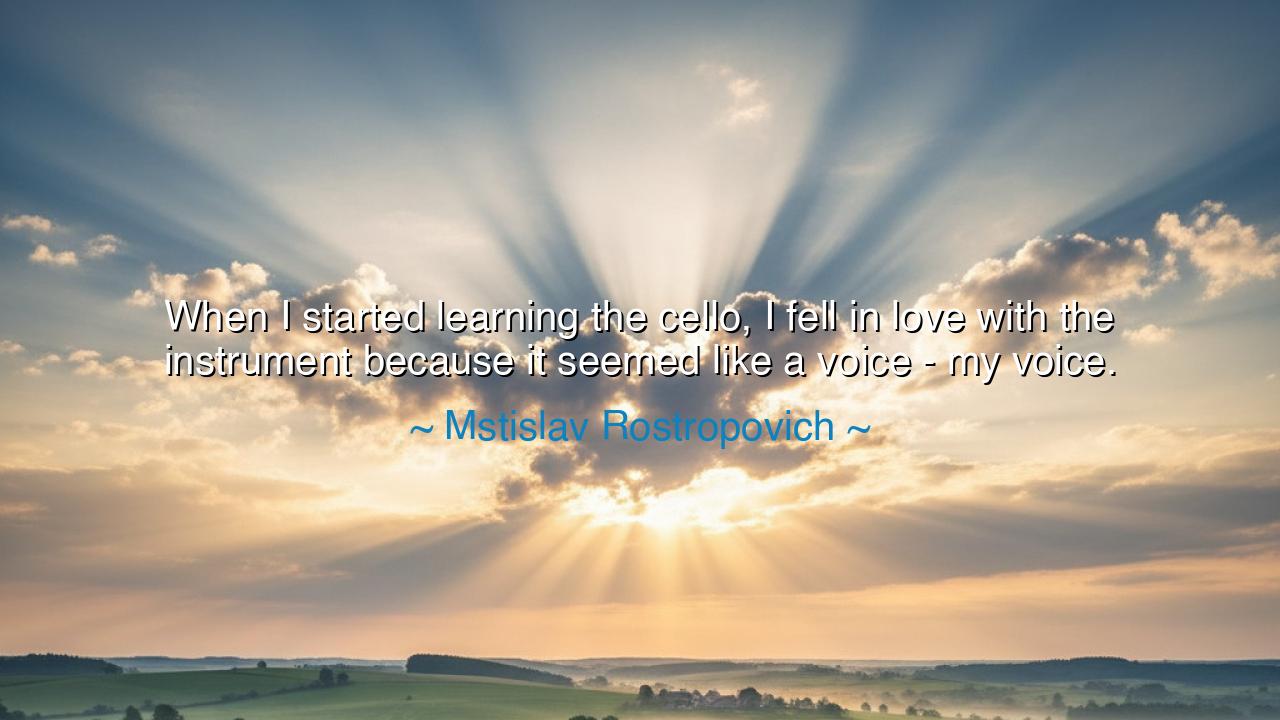
When I started learning the cello, I fell in love with the
When I started learning the cello, I fell in love with the instrument because it seemed like a voice - my voice.






“When I started learning the cello, I fell in love with the instrument because it seemed like a voice — my voice.” — Mstislav Rostropovich
In these words, the great cellist Mstislav Rostropovich reveals the sacred union between artist and art, between the soul and its chosen instrument of expression. He speaks not merely of music, but of the awakening of identity — that moment when the inner spirit finds its voice in the world. To Rostropovich, the cello was not just wood, strings, and bow; it was an extension of his very being, the vessel through which his emotions, his griefs, his joys, and his hopes could take form. When he first began learning, he did not simply master technique — he discovered a way to speak without words. In that moment, his soul recognized itself in sound.
The ancients would have understood this well. In every craft, in every art, there lies a search for the instrument that mirrors the soul. For the poet, it is language; for the sculptor, stone; for the dancer, movement; for the musician, sound. When the artist finds that which resonates with their inner truth, the world itself becomes transformed. The voice that was once silent begins to sing, and the invisible takes form. Rostropovich’s love for the cello was thus the recognition of a divine correspondence — between the vibration of strings and the vibration of his spirit.
The origin of his words lies in his own story. Born in the Soviet Union, he began studying music under his parents’ guidance, yet it was the cello that called to him, like a companion waiting to be found. He would go on to become one of the greatest cellists the world has ever known, not merely for his skill, but for the emotion that flowed through his playing. When he performed, listeners felt as though they heard not an instrument, but a human being speaking in tones too deep and tender for speech. The cello became his confession, his prayer, his defiance — a voice that transcended censorship and politics, reaching instead for something eternal.
In his life, Rostropovich showed that the truest art is born not from ambition, but from love — the love of expression itself. When he played, the cello wept and rejoiced, thundered and whispered. It was a conversation between the human heart and the divine. Such is the power of finding one’s voice: it allows the artist to translate the unseen world of emotion into a language others can understand. Each note he played was a declaration of authenticity — a reminder that creativity is not imitation, but revelation.
There is a lesson here for all who seek meaning. Each of us is born with a voice, though not all discover it easily. It may not take the form of music — it may be found in words, in service, in craft, or in the quiet acts of kindness that ripple through the world. To find one’s voice is to find one’s truth, and to live in harmony with it. The process of learning, as Rostropovich reminds us, is not merely about acquiring skill, but about uncovering the self — about finding that medium through which our deepest nature can speak freely.
Consider also the example of Vincent van Gogh, who, despite rejection and despair, continued to paint because color and form were his voice. He could not remain silent, for the canvas was his confession. Like Rostropovich, he did not choose his art — his art chose him. This is the mark of true calling: when one finds that particular path through which the inner life must flow, no obstacle can silence it. Such is the sacred law of creation — that every soul, once awakened to its instrument, must speak, sing, or paint, no matter the cost.
Thus, dear seeker, take this as both wisdom and challenge: seek that which feels like your voice. Do not imitate another’s song; find your own. Try many crafts, explore many paths, and when something stirs your spirit — when the act itself feels like breathing, like remembering — hold fast to it. Whether it is music, writing, teaching, healing, or any noble work, pour yourself into it until it no longer feels like labor but conversation. For when you, like Rostropovich, find that which speaks your truth, the world will not merely hear you — it will feel you. And that, perhaps, is the highest form of life’s art: to discover that what we create is not separate from us, but is, in fact, the purest echo of who we truly are.






AAdministratorAdministrator
Welcome, honored guests. Please leave a comment, we will respond soon